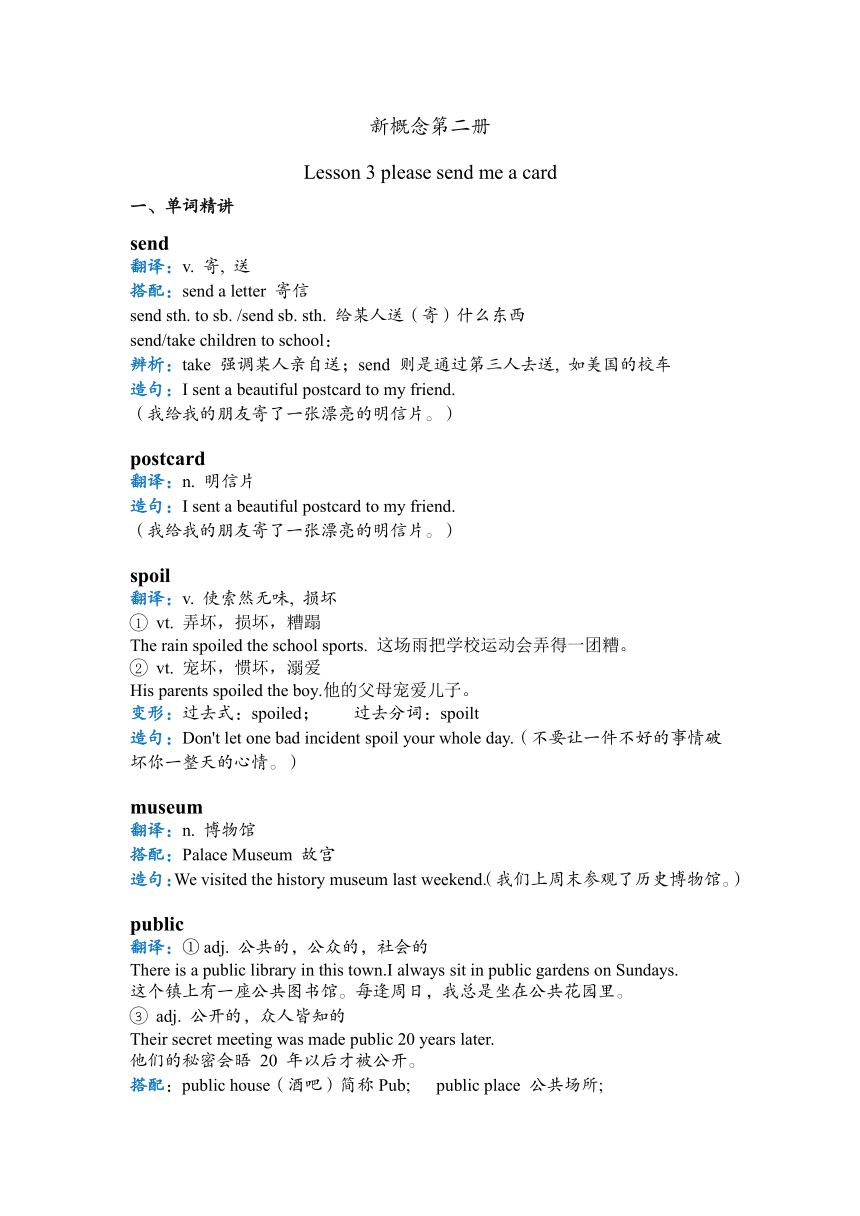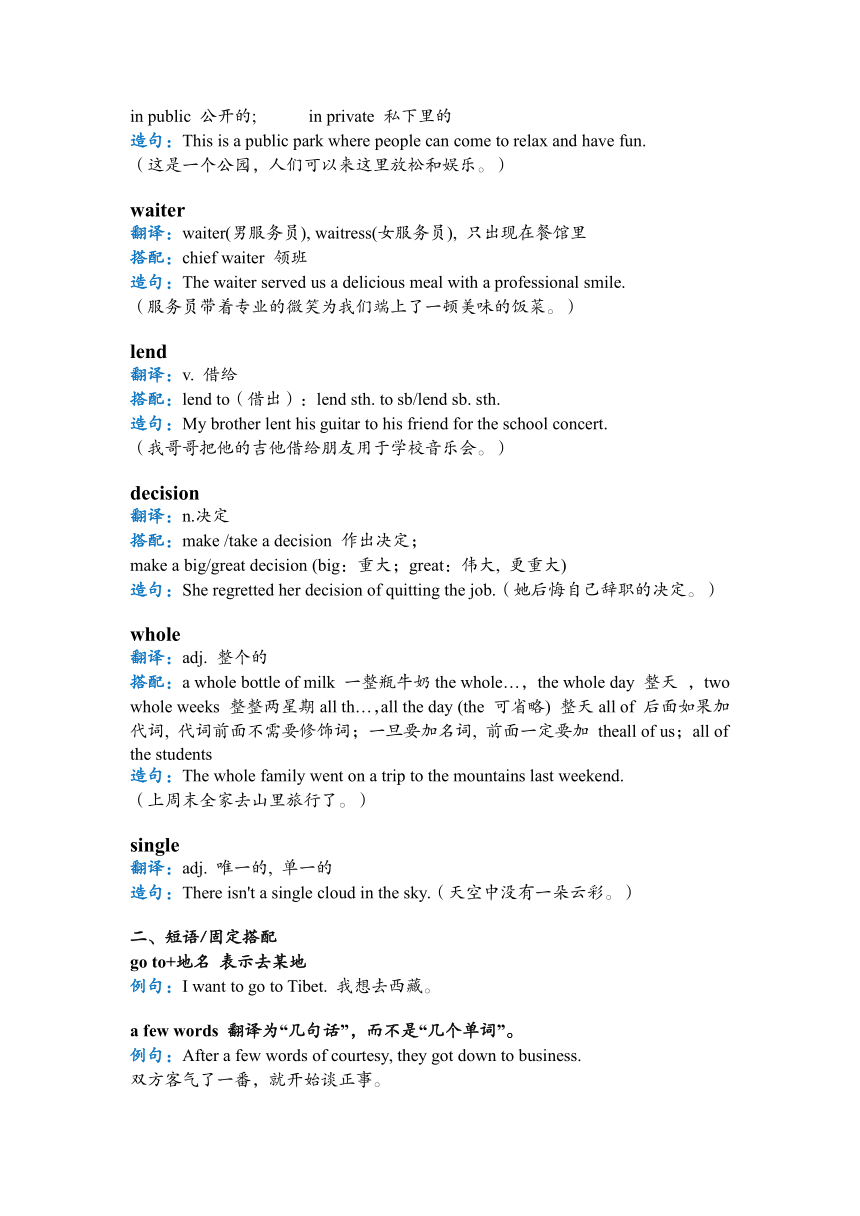新概念第二册Lesson 3 please send me a card 讲义
文档属性
| 名称 | 新概念第二册Lesson 3 please send me a card 讲义 |

|
|
| 格式 | docx | ||
| 文件大小 | 153.2KB | ||
| 资源类型 | 教案 | ||
| 版本资源 | 新概念英语 | ||
| 科目 | 英语 | ||
| 更新时间 | 2024-11-19 00:00:00 | ||
图片预览


文档简介
新概念第二册
Lesson 3 please send me a card
单词精讲
send
翻译:v. 寄, 送
搭配:send a letter 寄信
send sth. to sb. /send sb. sth. 给某人送(寄)什么东西
send/take children to school:
辨析:take 强调某人亲自送;send 则是通过第三人去送, 如美国的校车
造句:I sent a beautiful postcard to my friend.
(我给我的朋友寄了一张漂亮的明信片。)
postcard
翻译:n. 明信片
造句:I sent a beautiful postcard to my friend.
(我给我的朋友寄了一张漂亮的明信片。)
spoil
翻译:v. 使索然无味, 损坏
vt. 弄坏,损坏,糟蹋
The rain spoiled the school sports. 这场雨把学校运动会弄得一团糟。
vt. 宠坏,惯坏,溺爱
His parents spoiled the boy.他的父母宠爱儿子。
变形:过去式:spoiled; 过去分词:spoilt
造句:Don't let one bad incident spoil your whole day.(不要让一件不好的事情破坏你一整天的心情。)
museum
翻译:n. 博物馆
搭配:Palace Museum 故宫
造句:We visited the history museum last weekend.(我们上周末参观了历史博物馆。)
public
翻译:① adj. 公共的,公众的,社会的
There is a public library in this town.I always sit in public gardens on Sundays.
这个镇上有一座公共图书馆。每逢周日,我总是坐在公共花园里。
adj. 公开的,众人皆知的
Their secret meeting was made public 20 years later.
他们的秘密会晤 20 年以后才被公开。
搭配:public house(酒吧)简称Pub; public place 公共场所;
in public 公开的; in private 私下里的
造句:This is a public park where people can come to relax and have fun.
(这是一个公园,人们可以来这里放松和娱乐。)
waiter
翻译:waiter(男服务员), waitress(女服务员), 只出现在餐馆里
搭配:chief waiter 领班
造句:The waiter served us a delicious meal with a professional smile.
(服务员带着专业的微笑为我们端上了一顿美味的饭菜。)
lend
翻译:v. 借给
搭配:lend to(借出):lend sth. to sb/lend sb. sth.
造句:My brother lent his guitar to his friend for the school concert.
(我哥哥把他的吉他借给朋友用于学校音乐会。)
decision
翻译:n.决定
搭配:make /take a decision 作出决定;
make a big/great decision (big:重大;great:伟大, 更重大)
造句:She regretted her decision of quitting the job.(她后悔自己辞职的决定。)
whole
翻译:adj. 整个的
搭配:a whole bottle of milk 一整瓶牛奶the whole…,the whole day 整天 ,two whole weeks 整整两星期all th…,all the day (the 可省略) 整天all of 后面如果加代词, 代词前面不需要修饰词;一旦要加名词, 前面一定要加 theall of us;all of the students
造句:The whole family went on a trip to the mountains last weekend.
(上周末全家去山里旅行了。)
single
翻译:adj. 唯一的, 单一的
造句:There isn't a single cloud in the sky.(天空中没有一朵云彩。)
二、短语/固定搭配
go to+地名 表示去某地
例句:I want to go to Tibet. 我想去西藏。
a few words 翻译为“几句话”,而不是“几个单词”。
例句:After a few words of courtesy, they got down to business.
双方客气了一番,就开始谈正事。
think about 思考,思索
think about/ of sb./ sth. 考虑到,关心,替……着想
例句:Did you ever think about me 你什么时候为我想过
短语扩展
think ahead (to sth.) 预先计划,预想
We need to think ahead to the possible problems we might face during the project.
(我们需要预先考虑在项目过程中可能面临的问题。)
think back 回想,追忆
When I think back to my childhood, I feel very happy.
(当我回想起我的童年时,我感到非常快乐。)
think for yourself 独立思考,自行决定
Don't just follow others' opinions. You should think for yourself.
(不要只是跟随别人的观点。你应该独立思考。)
think sth. over 仔细考虑,慎重思考
He decided to think the job offer over for a few days.
(他决定用几天时间慎重思考这个工作机会。)
lent me a book 借给我一本书
My friend lent me a book about space exploration last week.
(我的朋友上周借给我一本关于太空探索的书。)
lent是“借出”的意思。我们常说lent sb sth. 或lent sth to sb.
She lent her brother some money to start his business.
(她借给她哥哥一些钱让他创业。)
He lent his new bike to his friend for the weekend.
(他把他的新自行车借给朋友过周末。)
borrow是“借入”的意思,常用的结构是borrow sth.或 borrow sth from sb.
I want to borrow a pen to write down this important information.
(我想借一支笔来写下这条重要信息。)
I borrowed a dictionary from my deskmate to look up the new words.
(我从同桌那里借了一本字典来查生词。)
the last day 最后一天 (具体到一天及一天的早中晚都要用 on)
We had a great party on the last day of the year.
(在一年的最后一天,我们举办了一场很棒的派对。)
teach sb. sth. 教某人做某事
My mother taught me how to cook delicious meals.(我妈妈教我如何做美味的饭菜。)
make/take a decision 作出决定
这是个常用的词语搭配,可以灵活使用.
三、重点句型
一般过去时:主要用来对过去发生的事情作一般性的描述。
①表示过去发生的事件和状态,只强调过去的一个事实,与现在无任何联系。
例句:I went to Beijing 3 years ago. 我三年前去过北京。
②表示过去的习惯性动作,而且必须带表示频率的时间状语。否则,只能表示过去的某个一次性动作。
例句:He wrote a letter every week. 他过去每周写一封信。
③叙述过去发生的一连串动作。在这一句型中,几个实义动词要求使用同一种形式。
例句:He washed his face, put on his coat, opened the door, and rushed out.
他洗完脸,穿上外套,打开门,然后冲了出去。
课文精讲
Postcards always spoil my holidays. Last summer, I went to Italy.
明信片总搅得我假日不得安宁.去年夏天, 我去了意大利.
①形式: 动词的过去式②用法:发生在过去的事情
I visited museums and sat in public gardens.
我参观了博物馆, 还去了公园.
完全发生在过去的事情,与现在无关,过去这样,现在不这样
A friendly waiter taught me a few words of Italian. Then he lent me a book.
一位好客的服务员教了我几句意大利语, 之后还借给我一本书.
语言不可数, 所以要用 a little Italian 或 a few words of Italian
a few 可与复数可数名词连用,表示肯定,含有 some,a small number of(一些,少数几个)的意思。
像send, buy, give等动词一样,lend可以有两个宾语:一个直接宾语(通常指物),一个间接宾语(通常指人)。(cf. 本课语法)在这句话中,lend的直接宾语为a book,间接宾语为me。
I read a few lines, but I did not understand a word. Everyday I thought about postcards.
我读了几行, 但一个字也不懂. 我每天都想着明信片的事.
not…a的否定意义比单用not要强。课文的最后一句加了single”,语气更强。
否定:be+not 或 did + not
一般疑问句: be提前 或did + 主语+ 动词原形(v.)
every day 每一天 ( 词组,表时间)
everyday 日常的,每天的(adj.)
everyday use. 日常用品
My holidays passed quickly, but I did not send cards to my friends.
假期过得真快, 可我还没有给我的朋友们寄过一张明信片.
On the last day I made a big decision.
到了最后一天, 我作出了一项重大决定.
make a decision to do sth
She made a decision to study abroad next year.(她决定明年出国留学。)
意思相近的表达有:
take a decision to do sth
They took a decision to start their own business after much discussion.
(经过多次讨论后,他们决定自己创业。)
make up one’s mind to do sth
He made up his mind to learn a new skill during the holiday.
(他下定决心在假期学习一项新技能。)
decide to do sth
I decided to go hiking this weekend.(我决定这个周末去徒步旅行。)
be determined to do sth
She is determined to win the first prize in the competition.
(她下定决心要在比赛中赢得一等奖。)
I got up early and bought thirty-seven cards.
我早早起了床, 买来了 37 张明信片.
I spent the whole day in my room, but I did not write a single card!
我在房间里关了整整一天. 然而竟连一张明信片也没写成!
spend 与表示时间的词或短语连和时,意思为“花(时间)”、“度过”
I spent two hours doing my homework last night.(昨晚我花了两个小时做作业。)
spend+时间+地点 : 在什么地点我花费/度过了多少时间
I spent three days in Paris last year.(去年我在巴黎度过了三天。)
spend 还可以表示“花钱”
I spent 50 dollars on this new shirt.(我花 50 美元买了这件新衬衫。)
the whole day=all day
近义词: spend, cost, take, pay
1) cost: 花费、开支。常构成sth costs sb money。做名词时指价钱、成本、费用、代价。
He saved the boy from drowning at the cost of his life
2) take 一般指某事需要或花费某人多长时间完成
The work took us four hours.
3) pay 付款给某人 pay sb, pay for sth, pay sb sth
You must pay for my dinner today
Lesson 3 please send me a card
单词精讲
send
翻译:v. 寄, 送
搭配:send a letter 寄信
send sth. to sb. /send sb. sth. 给某人送(寄)什么东西
send/take children to school:
辨析:take 强调某人亲自送;send 则是通过第三人去送, 如美国的校车
造句:I sent a beautiful postcard to my friend.
(我给我的朋友寄了一张漂亮的明信片。)
postcard
翻译:n. 明信片
造句:I sent a beautiful postcard to my friend.
(我给我的朋友寄了一张漂亮的明信片。)
spoil
翻译:v. 使索然无味, 损坏
vt. 弄坏,损坏,糟蹋
The rain spoiled the school sports. 这场雨把学校运动会弄得一团糟。
vt. 宠坏,惯坏,溺爱
His parents spoiled the boy.他的父母宠爱儿子。
变形:过去式:spoiled; 过去分词:spoilt
造句:Don't let one bad incident spoil your whole day.(不要让一件不好的事情破坏你一整天的心情。)
museum
翻译:n. 博物馆
搭配:Palace Museum 故宫
造句:We visited the history museum last weekend.(我们上周末参观了历史博物馆。)
public
翻译:① adj. 公共的,公众的,社会的
There is a public library in this town.I always sit in public gardens on Sundays.
这个镇上有一座公共图书馆。每逢周日,我总是坐在公共花园里。
adj. 公开的,众人皆知的
Their secret meeting was made public 20 years later.
他们的秘密会晤 20 年以后才被公开。
搭配:public house(酒吧)简称Pub; public place 公共场所;
in public 公开的; in private 私下里的
造句:This is a public park where people can come to relax and have fun.
(这是一个公园,人们可以来这里放松和娱乐。)
waiter
翻译:waiter(男服务员), waitress(女服务员), 只出现在餐馆里
搭配:chief waiter 领班
造句:The waiter served us a delicious meal with a professional smile.
(服务员带着专业的微笑为我们端上了一顿美味的饭菜。)
lend
翻译:v. 借给
搭配:lend to(借出):lend sth. to sb/lend sb. sth.
造句:My brother lent his guitar to his friend for the school concert.
(我哥哥把他的吉他借给朋友用于学校音乐会。)
decision
翻译:n.决定
搭配:make /take a decision 作出决定;
make a big/great decision (big:重大;great:伟大, 更重大)
造句:She regretted her decision of quitting the job.(她后悔自己辞职的决定。)
whole
翻译:adj. 整个的
搭配:a whole bottle of milk 一整瓶牛奶the whole…,the whole day 整天 ,two whole weeks 整整两星期all th…,all the day (the 可省略) 整天all of 后面如果加代词, 代词前面不需要修饰词;一旦要加名词, 前面一定要加 theall of us;all of the students
造句:The whole family went on a trip to the mountains last weekend.
(上周末全家去山里旅行了。)
single
翻译:adj. 唯一的, 单一的
造句:There isn't a single cloud in the sky.(天空中没有一朵云彩。)
二、短语/固定搭配
go to+地名 表示去某地
例句:I want to go to Tibet. 我想去西藏。
a few words 翻译为“几句话”,而不是“几个单词”。
例句:After a few words of courtesy, they got down to business.
双方客气了一番,就开始谈正事。
think about 思考,思索
think about/ of sb./ sth. 考虑到,关心,替……着想
例句:Did you ever think about me 你什么时候为我想过
短语扩展
think ahead (to sth.) 预先计划,预想
We need to think ahead to the possible problems we might face during the project.
(我们需要预先考虑在项目过程中可能面临的问题。)
think back 回想,追忆
When I think back to my childhood, I feel very happy.
(当我回想起我的童年时,我感到非常快乐。)
think for yourself 独立思考,自行决定
Don't just follow others' opinions. You should think for yourself.
(不要只是跟随别人的观点。你应该独立思考。)
think sth. over 仔细考虑,慎重思考
He decided to think the job offer over for a few days.
(他决定用几天时间慎重思考这个工作机会。)
lent me a book 借给我一本书
My friend lent me a book about space exploration last week.
(我的朋友上周借给我一本关于太空探索的书。)
lent是“借出”的意思。我们常说lent sb sth. 或lent sth to sb.
She lent her brother some money to start his business.
(她借给她哥哥一些钱让他创业。)
He lent his new bike to his friend for the weekend.
(他把他的新自行车借给朋友过周末。)
borrow是“借入”的意思,常用的结构是borrow sth.或 borrow sth from sb.
I want to borrow a pen to write down this important information.
(我想借一支笔来写下这条重要信息。)
I borrowed a dictionary from my deskmate to look up the new words.
(我从同桌那里借了一本字典来查生词。)
the last day 最后一天 (具体到一天及一天的早中晚都要用 on)
We had a great party on the last day of the year.
(在一年的最后一天,我们举办了一场很棒的派对。)
teach sb. sth. 教某人做某事
My mother taught me how to cook delicious meals.(我妈妈教我如何做美味的饭菜。)
make/take a decision 作出决定
这是个常用的词语搭配,可以灵活使用.
三、重点句型
一般过去时:主要用来对过去发生的事情作一般性的描述。
①表示过去发生的事件和状态,只强调过去的一个事实,与现在无任何联系。
例句:I went to Beijing 3 years ago. 我三年前去过北京。
②表示过去的习惯性动作,而且必须带表示频率的时间状语。否则,只能表示过去的某个一次性动作。
例句:He wrote a letter every week. 他过去每周写一封信。
③叙述过去发生的一连串动作。在这一句型中,几个实义动词要求使用同一种形式。
例句:He washed his face, put on his coat, opened the door, and rushed out.
他洗完脸,穿上外套,打开门,然后冲了出去。
课文精讲
Postcards always spoil my holidays. Last summer, I went to Italy.
明信片总搅得我假日不得安宁.去年夏天, 我去了意大利.
①形式: 动词的过去式②用法:发生在过去的事情
I visited museums and sat in public gardens.
我参观了博物馆, 还去了公园.
完全发生在过去的事情,与现在无关,过去这样,现在不这样
A friendly waiter taught me a few words of Italian. Then he lent me a book.
一位好客的服务员教了我几句意大利语, 之后还借给我一本书.
语言不可数, 所以要用 a little Italian 或 a few words of Italian
a few 可与复数可数名词连用,表示肯定,含有 some,a small number of(一些,少数几个)的意思。
像send, buy, give等动词一样,lend可以有两个宾语:一个直接宾语(通常指物),一个间接宾语(通常指人)。(cf. 本课语法)在这句话中,lend的直接宾语为a book,间接宾语为me。
I read a few lines, but I did not understand a word. Everyday I thought about postcards.
我读了几行, 但一个字也不懂. 我每天都想着明信片的事.
not…a的否定意义比单用not要强。课文的最后一句加了single”,语气更强。
否定:be+not 或 did + not
一般疑问句: be提前 或did + 主语+ 动词原形(v.)
every day 每一天 ( 词组,表时间)
everyday 日常的,每天的(adj.)
everyday use. 日常用品
My holidays passed quickly, but I did not send cards to my friends.
假期过得真快, 可我还没有给我的朋友们寄过一张明信片.
On the last day I made a big decision.
到了最后一天, 我作出了一项重大决定.
make a decision to do sth
She made a decision to study abroad next year.(她决定明年出国留学。)
意思相近的表达有:
take a decision to do sth
They took a decision to start their own business after much discussion.
(经过多次讨论后,他们决定自己创业。)
make up one’s mind to do sth
He made up his mind to learn a new skill during the holiday.
(他下定决心在假期学习一项新技能。)
decide to do sth
I decided to go hiking this weekend.(我决定这个周末去徒步旅行。)
be determined to do sth
She is determined to win the first prize in the competition.
(她下定决心要在比赛中赢得一等奖。)
I got up early and bought thirty-seven cards.
我早早起了床, 买来了 37 张明信片.
I spent the whole day in my room, but I did not write a single card!
我在房间里关了整整一天. 然而竟连一张明信片也没写成!
spend 与表示时间的词或短语连和时,意思为“花(时间)”、“度过”
I spent two hours doing my homework last night.(昨晚我花了两个小时做作业。)
spend+时间+地点 : 在什么地点我花费/度过了多少时间
I spent three days in Paris last year.(去年我在巴黎度过了三天。)
spend 还可以表示“花钱”
I spent 50 dollars on this new shirt.(我花 50 美元买了这件新衬衫。)
the whole day=all day
近义词: spend, cost, take, pay
1) cost: 花费、开支。常构成sth costs sb money。做名词时指价钱、成本、费用、代价。
He saved the boy from drowning at the cost of his life
2) take 一般指某事需要或花费某人多长时间完成
The work took us four hours.
3) pay 付款给某人 pay sb, pay for sth, pay sb sth
You must pay for my dinner today
同课章节目录
